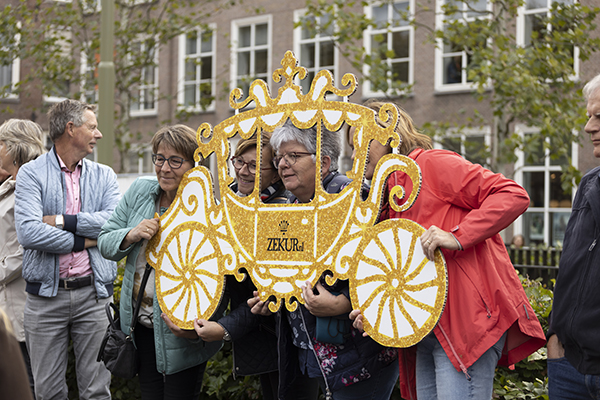For a second year running, there was a no-frills policy at this year’s Prinsjesdag (‘Little Princes Day’). With its adjusted corona programme, members of the press were directed to sit in a corner of the Grote Kerk in The Hague and the day was marked by a distinct lack of royalty fans watching en route. No royal carriage tour, no military display, no horses, and no royal balcony scene. All in all, a sobering affair. But the show had to go on, and Prinsjesdag did take place. There were even some positive signs, such as the economy, which appears to be recovering well from the effects of corona.
“The king’s tour on Prinsjesdag 2021 is cancelled. The municipality of The Hague asks people not to come to The Hague on Prinsjesdag. Instead, the ceremony can be followed on television,” the government declared in advance. So, for the second year in a row, the public missed out on the chance to watch the ceremony’s proceedings live, instead having to resort to watching TV.
On top of that, there were protests against the corona regulations in the city, and then there was that pesky little issue there still not being a government hanging over it all. There were even reports that the monarch’s chief stable master, normally involved in the event, was retiring following 25 years of loyal service to the monarch. “It may well become the bleakest Prinsjesdag in years,” reported political reporter Thomas van Groningen from The Hague. Some of the live tweets by the AD newspaper were not much better when it came to the overall solemn mood of the day. At 12:44: “Protesters on the Plein in The Hague want to go to Lange Poten, but are not allowed by the police,” and at 12:58: “The press are sitting in a corner of the Grote Kerk and are not allowed to leave. Strict rules in force.”
Some crowds, some hats
Still, Prinsjesdag, the first day of the new parliamentary year, remains an important day for Dutch politics, and despite everything, the event had to go on. AD reported that there were still crowds along the route to the Grote Kerk; for some, skipping the event was simply not an option. “No carriages, no Ridderzaal, and no sitting cabinet. But still: the hats, the Grote Kerk and a speech from the throne,” reported the NOS in a similar light.
“These are turbulent times in The Hague: the government formation has been stuck for months, the ministers of the Rutte 3 government are resigning left and right, and the mutual relationships between the political protagonists don’t seem to be getting any better,” reported political editor Guus Dietvorst on the NOS, and added: “But the earth continues to rotate, so today is the third Tuesday in September. So: Prinsjesdag.”
Thus, King Willem-Alexander opened the new working year of the Senate and House of Representatives, delivered his traditional speech from the throne in the Grote Kerk, and, albeit by car, the royal family made the journey through The Hague to the church. Politicians offered their comments on the 2022 plans of the outgoing cabinet, and the Finance Minister presented the budget for 2022 to the House of Representatives in his well-known briefcase.
Key messages
In the King’s speech, the Covid crisis, climate change and the Taliban’s conquest of Afghanistan were some of the main topics. GroenLinks leader Jesse Klaver tweeted following the ceremony: “The nitrogen crisis, the climate crisis, the housing crisis, growing inequality: we can no longer ignore these problems,” and indeed the speech did not ignore these major themes that the next government will have to face. The king repeatedly emphasised the importance of climate policy in the coming period, citing the flood that hit Limburg this year ‘a serioues warning,’ and an additional 6 to 7 billion Euros will be spent to reduce CO2emissions. The King was positive about the country’s economy and its room for growth, and pointed to the potential of Dutch companies to help solve today’s problems. Indeed, the country enjoys many economic opportunities, for example in the export of Dutch knowledge in the field of sustainable technology.
An extra one-billion-dollar stimulus is assigned in the new budget to combat climate change and support the economy. As other main problems to be solved, the government pointed to the housing shortage, the rise of organised crime, and necessary changes in tax collection. The government asserted that ‘sustainable economic growth must safeguard the prosperity, jobs and income of future generations,’ and announced investment plans worth 300 million Euros for ‘innovative technology and strategic autonomy for our entrepreneurs,’ as well as a further 2.3 billion Euros for housing construction and making buildings more sustainable.
Written by Femke van Iperen
